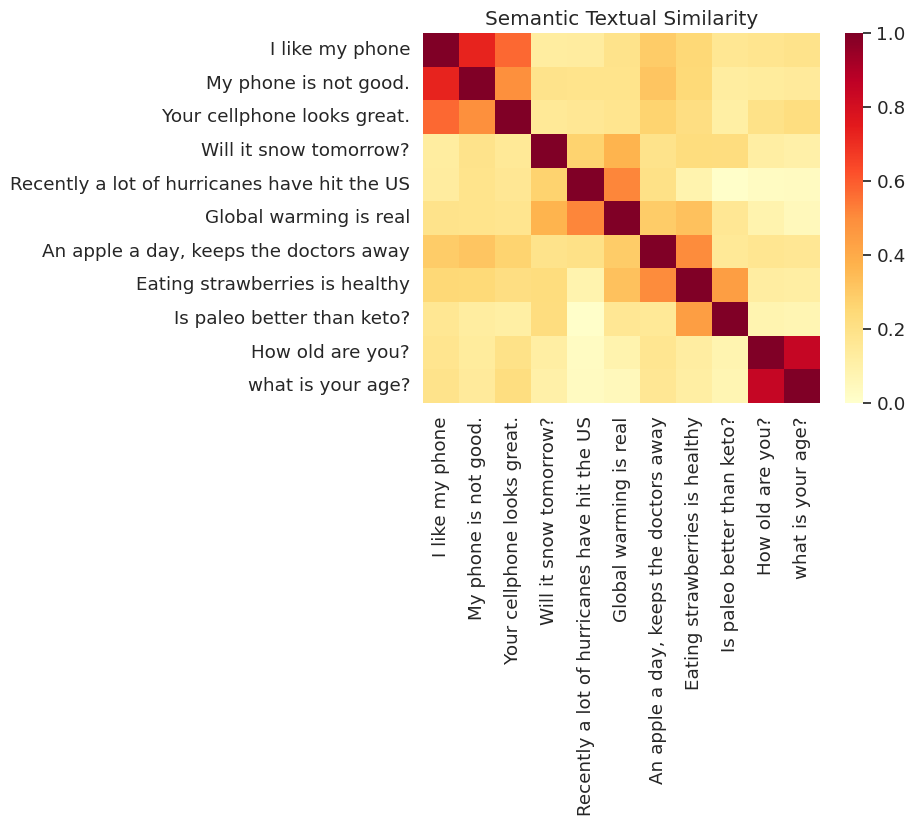 ดูบน TensorFlow.org ดูบน TensorFlow.org |  ทำงานใน Google Colab ทำงานใน Google Colab |  ดูบน GitHub ดูบน GitHub |  ดาวน์โหลดโน๊ตบุ๊ค ดาวน์โหลดโน๊ตบุ๊ค |  ดูรุ่น TF Hub ดูรุ่น TF Hub |
Colab นี้แสดงวิธีใช้ Universal Sentence Encoder-Lite สำหรับงานที่มีความคล้ายคลึงกันของประโยค โมดูลนี้จะคล้ายกับ ยูนิเวอร์แซประโยค Encoder มีความแตกต่างเดียวที่คุณจำเป็นต้องเรียกใช้ SentencePiece การประมวลผลในประโยคป้อนข้อมูลของคุณ
Universal Sentence Encoder ทำให้การฝังระดับประโยคทำได้ง่ายเหมือนกับการค้นหาการฝังสำหรับคำแต่ละคำในอดีต การฝังประโยคสามารถใช้เล็กน้อยในการคำนวณระดับประโยคซึ่งหมายถึงความคล้ายคลึงกัน และเพื่อให้มีประสิทธิภาพที่ดีขึ้นในงานจำแนกประเภทดาวน์สตรีมโดยใช้ข้อมูลการฝึกอบรมที่มีการดูแลน้อยกว่า
เริ่มต้น
ติดตั้ง
# Install seaborn for pretty visualizationspip3 install --quiet seaborn# Install SentencePiece package# SentencePiece package is needed for Universal Sentence Encoder Lite. We'll# use it for all the text processing and sentence feature ID lookup.pip3 install --quiet sentencepiece
from absl import logging
import tensorflow.compat.v1 as tf
tf.disable_v2_behavior()
import tensorflow_hub as hub
import sentencepiece as spm
import matplotlib.pyplot as plt
import numpy as np
import os
import pandas as pd
import re
import seaborn as sns
WARNING:tensorflow:From /tmpfs/src/tf_docs_env/lib/python3.7/site-packages/tensorflow/python/compat/v2_compat.py:111: disable_resource_variables (from tensorflow.python.ops.variable_scope) is deprecated and will be removed in a future version. Instructions for updating: non-resource variables are not supported in the long term
โหลดโมดูลจาก TF-Hub
module = hub.Module("https://tfhub.dev/google/universal-sentence-encoder-lite/2")
input_placeholder = tf.sparse_placeholder(tf.int64, shape=[None, None])
encodings = module(
inputs=dict(
values=input_placeholder.values,
indices=input_placeholder.indices,
dense_shape=input_placeholder.dense_shape))
INFO:tensorflow:Saver not created because there are no variables in the graph to restore INFO:tensorflow:Saver not created because there are no variables in the graph to restore
โหลดโมเดล SentencePiece จาก TF-Hub Module
โมเดล SentencePiece ถูกจัดเก็บไว้อย่างสะดวกภายในสินทรัพย์ของโมดูล ต้องโหลดเพื่อเริ่มต้นโปรเซสเซอร์
with tf.Session() as sess:
spm_path = sess.run(module(signature="spm_path"))
sp = spm.SentencePieceProcessor()
with tf.io.gfile.GFile(spm_path, mode="rb") as f:
sp.LoadFromSerializedProto(f.read())
print("SentencePiece model loaded at {}.".format(spm_path))
INFO:tensorflow:Saver not created because there are no variables in the graph to restore INFO:tensorflow:Saver not created because there are no variables in the graph to restore SentencePiece model loaded at b'/tmp/tfhub_modules/539544f0a997d91c327c23285ea00c37588d92cc/assets/universal_encoder_8k_spm.model'.
def process_to_IDs_in_sparse_format(sp, sentences):
# An utility method that processes sentences with the sentence piece processor
# 'sp' and returns the results in tf.SparseTensor-similar format:
# (values, indices, dense_shape)
ids = [sp.EncodeAsIds(x) for x in sentences]
max_len = max(len(x) for x in ids)
dense_shape=(len(ids), max_len)
values=[item for sublist in ids for item in sublist]
indices=[[row,col] for row in range(len(ids)) for col in range(len(ids[row]))]
return (values, indices, dense_shape)
ทดสอบโมดูลด้วยตัวอย่างบางส่วน
# Compute a representation for each message, showing various lengths supported.
word = "Elephant"
sentence = "I am a sentence for which I would like to get its embedding."
paragraph = (
"Universal Sentence Encoder embeddings also support short paragraphs. "
"There is no hard limit on how long the paragraph is. Roughly, the longer "
"the more 'diluted' the embedding will be.")
messages = [word, sentence, paragraph]
values, indices, dense_shape = process_to_IDs_in_sparse_format(sp, messages)
# Reduce logging output.
logging.set_verbosity(logging.ERROR)
with tf.Session() as session:
session.run([tf.global_variables_initializer(), tf.tables_initializer()])
message_embeddings = session.run(
encodings,
feed_dict={input_placeholder.values: values,
input_placeholder.indices: indices,
input_placeholder.dense_shape: dense_shape})
for i, message_embedding in enumerate(np.array(message_embeddings).tolist()):
print("Message: {}".format(messages[i]))
print("Embedding size: {}".format(len(message_embedding)))
message_embedding_snippet = ", ".join(
(str(x) for x in message_embedding[:3]))
print("Embedding: [{}, ...]\n".format(message_embedding_snippet))
Message: Elephant Embedding size: 512 Embedding: [0.053387489169836044, 0.053194381296634674, -0.052356015890836716, ...] Message: I am a sentence for which I would like to get its embedding. Embedding size: 512 Embedding: [0.03533298149704933, -0.04714975506067276, 0.012305550277233124, ...] Message: Universal Sentence Encoder embeddings also support short paragraphs. There is no hard limit on how long the paragraph is. Roughly, the longer the more 'diluted' the embedding will be. Embedding size: 512 Embedding: [-0.004081667400896549, -0.08954868465662003, 0.03737196698784828, ...]
ตัวอย่างงาน Semantic Textual Similarity (STS)
การฝังที่สร้างโดย Universal Sentence Encoder จะถูกทำให้เป็นมาตรฐานโดยประมาณ ความคล้ายคลึงกันทางความหมายของสองประโยคสามารถคำนวณได้เล็กน้อยในฐานะผลิตภัณฑ์ภายในของการเข้ารหัส
def plot_similarity(labels, features, rotation):
corr = np.inner(features, features)
sns.set(font_scale=1.2)
g = sns.heatmap(
corr,
xticklabels=labels,
yticklabels=labels,
vmin=0,
vmax=1,
cmap="YlOrRd")
g.set_xticklabels(labels, rotation=rotation)
g.set_title("Semantic Textual Similarity")
def run_and_plot(session, input_placeholder, messages):
values, indices, dense_shape = process_to_IDs_in_sparse_format(sp,messages)
message_embeddings = session.run(
encodings,
feed_dict={input_placeholder.values: values,
input_placeholder.indices: indices,
input_placeholder.dense_shape: dense_shape})
plot_similarity(messages, message_embeddings, 90)
ความคล้ายคลึงที่มองเห็นได้
ที่นี่เราแสดงความคล้ายคลึงกันในแผนที่ความร้อน กราฟสุดท้ายคือเมทริกซ์ 9x9 ที่แต่ละรายการ [i, j] เป็นสีขึ้นอยู่กับผลิตภัณฑ์ด้านการเข้ารหัสสำหรับประโยคที่ i และ j
messages = [
# Smartphones
"I like my phone",
"My phone is not good.",
"Your cellphone looks great.",
# Weather
"Will it snow tomorrow?",
"Recently a lot of hurricanes have hit the US",
"Global warming is real",
# Food and health
"An apple a day, keeps the doctors away",
"Eating strawberries is healthy",
"Is paleo better than keto?",
# Asking about age
"How old are you?",
"what is your age?",
]
with tf.Session() as session:
session.run(tf.global_variables_initializer())
session.run(tf.tables_initializer())
run_and_plot(session, input_placeholder, messages)

การประเมินผล: เกณฑ์มาตรฐาน STS (ความคล้ายคลึงข้อความเชิงความหมาย)
STS เกณฑ์มาตรฐาน ให้การประเมินผล intristic ของระดับที่คะแนนความคล้ายคลึงกันคำนวณโดยใช้ embeddings ประโยคสอดคล้องกับคำตัดสินของมนุษย์ เกณฑ์มาตรฐานกำหนดให้ระบบแสดงผลคะแนนความคล้ายคลึงกันสำหรับการเลือกคู่ประโยคที่หลากหลาย เพียร์สันความสัมพันธ์ ที่ใช้แล้วเพื่อประเมินคุณภาพของคะแนนที่เครื่องคล้ายคลึงกันกับคำตัดสินของมนุษย์
ดาวน์โหลดข้อมูล
import pandas
import scipy
import math
def load_sts_dataset(filename):
# Loads a subset of the STS dataset into a DataFrame. In particular both
# sentences and their human rated similarity score.
sent_pairs = []
with tf.gfile.GFile(filename, "r") as f:
for line in f:
ts = line.strip().split("\t")
# (sent_1, sent_2, similarity_score)
sent_pairs.append((ts[5], ts[6], float(ts[4])))
return pandas.DataFrame(sent_pairs, columns=["sent_1", "sent_2", "sim"])
def download_and_load_sts_data():
sts_dataset = tf.keras.utils.get_file(
fname="Stsbenchmark.tar.gz",
origin="http://ixa2.si.ehu.es/stswiki/images/4/48/Stsbenchmark.tar.gz",
extract=True)
sts_dev = load_sts_dataset(
os.path.join(os.path.dirname(sts_dataset), "stsbenchmark", "sts-dev.csv"))
sts_test = load_sts_dataset(
os.path.join(
os.path.dirname(sts_dataset), "stsbenchmark", "sts-test.csv"))
return sts_dev, sts_test
sts_dev, sts_test = download_and_load_sts_data()
Downloading data from http://ixa2.si.ehu.es/stswiki/images/4/48/Stsbenchmark.tar.gz 417792/409630 [==============================] - 2s 5us/step 425984/409630 [===============================] - 2s 5us/step
สร้างกราฟการประเมิน
sts_input1 = tf.sparse_placeholder(tf.int64, shape=(None, None))
sts_input2 = tf.sparse_placeholder(tf.int64, shape=(None, None))
# For evaluation we use exactly normalized rather than
# approximately normalized.
sts_encode1 = tf.nn.l2_normalize(
module(
inputs=dict(values=sts_input1.values,
indices=sts_input1.indices,
dense_shape=sts_input1.dense_shape)),
axis=1)
sts_encode2 = tf.nn.l2_normalize(
module(
inputs=dict(values=sts_input2.values,
indices=sts_input2.indices,
dense_shape=sts_input2.dense_shape)),
axis=1)
sim_scores = -tf.acos(tf.reduce_sum(tf.multiply(sts_encode1, sts_encode2), axis=1))
INFO:tensorflow:Saver not created because there are no variables in the graph to restore INFO:tensorflow:Saver not created because there are no variables in the graph to restore INFO:tensorflow:Saver not created because there are no variables in the graph to restore INFO:tensorflow:Saver not created because there are no variables in the graph to restore
ประเมินการฝังประโยค
เลือกชุดข้อมูลสำหรับการวัดประสิทธิภาพ
dataset = sts_dev
values1, indices1, dense_shape1 = process_to_IDs_in_sparse_format(sp, dataset['sent_1'].tolist())
values2, indices2, dense_shape2 = process_to_IDs_in_sparse_format(sp, dataset['sent_2'].tolist())
similarity_scores = dataset['sim'].tolist()
def run_sts_benchmark(session):
"""Returns the similarity scores"""
scores = session.run(
sim_scores,
feed_dict={
sts_input1.values: values1,
sts_input1.indices: indices1,
sts_input1.dense_shape: dense_shape1,
sts_input2.values: values2,
sts_input2.indices: indices2,
sts_input2.dense_shape: dense_shape2,
})
return scores
with tf.Session() as session:
session.run(tf.global_variables_initializer())
session.run(tf.tables_initializer())
scores = run_sts_benchmark(session)
pearson_correlation = scipy.stats.pearsonr(scores, similarity_scores)
print('Pearson correlation coefficient = {0}\np-value = {1}'.format(
pearson_correlation[0], pearson_correlation[1]))
Pearson correlation coefficient = 0.7856484874001958 p-value = 1.065794746e-314
